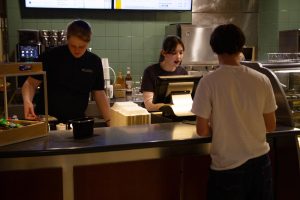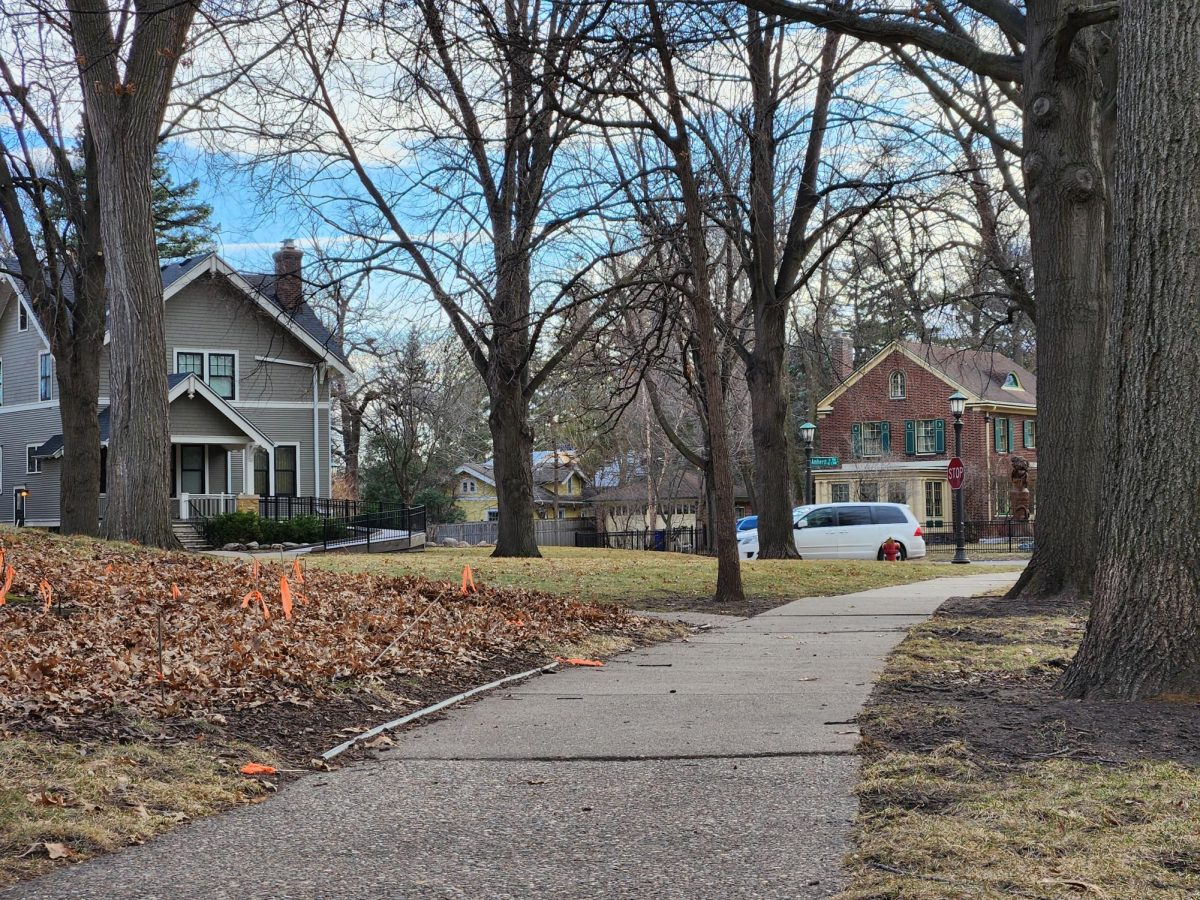By Molly Flerlage, Suzanne Savanick Hansen, Lydia Sulik
[email protected]
[email protected]
[email protected]
Students have long formed the backbone of sustainability efforts at Macalester through student organizations, work study positions, student government, and academic projects. Their efforts lead to policy changes, projects and sustainability education. As the Sustainability Office turns 10 years old this winter, the Sustainability Manager, MCSG Sustainability Officer, and the Sustainability Student Network Coordinator collectively reflected on the impact of students on campus sustainability.
Student sustainability efforts began in the 1960’s when students started the Macalester Recycling Organization to pick up recycling on campus. Since then many sustainability student organizations have been founded, including Macalester Community Action for Resilience, Environmentalism and Sustainability (MacCARES), Fossil Free Macalester, Macalester Urban Land and Community Health (MULCH), MacBike and Macalester Sustainable, Healthy, Anti-Racist Economy (MacSHARE).
In 2007, MacCARES students obtained an Environmental Protection Agency grant to build two green roofs on campus. Around the same time, MacBike students started the bikeshare program that still runs out of the Library. Last week MacSHARE organized the second cooperative food buy supported by over 80 students and staff.
In 2008 Justin Lee ‘08 convinced Facilities Services to hire him to help with research on sustainability projects. He found an inexpensive 100% post-consumer content toilet paper. Facilities Services saves $25,000 annually through the switch, proving that sustainable changes need not be a financial burden. Facilities Services now hires five sustainability student workers in addition to ten student staff in the Sustainability Office.
In 2009, student workers from the Sustainability Office and Bon Appetit collectively advocated for the food waste to pig food program in the dining hall. This change resulted in diverting one-third of the weight of the college’s trash to feed pigs, removing over 2 million pounds of food from the waste stream over the past 10 years.
Today, over 40 student workers representing numerous student organizations and departments come together in the Sustainability Student Network (SSN) to mitigate their departments’ environmental impact. The collective efforts of the SSN have produced many projects with huge positive impacts on institutional sustainability.
Macalester College Student Government (MCSG) has also been a strong supporter of sustainability initiatives on campus. MCSG resolutions have demonstrated support of fossil fuel divestment and the Real Food Challenge. In 2015 the MCSG solidified their commitment by adding a Sustainability Officer to the Legislative Body. One of the most impactful MCSG initiatives is the compostable dishware program available to all student organizations at no cost.
Additionally, many sustainability initiatives began in the classroom. Environmental Studies Senior Seminar students in 2008 calculated the first college greenhouse gas emissions report and, in 2009, recommended steps for the required Climate Action Plan. This research is an instrumental piece of Macalester’s Carbon Neutral by 2025 goal. Every year students in the Sustainability and the Campus class make real change on campus through course projects. The Urban Sustainability Living Laboratory Project Ideas website keeps a record of these and other academic projects.
Students insist that sustainability is a community priority and should be reflected as an institutional value. In 2000 students convinced President McPherson to sign the Talloires Declaration, the first collective pledge by college presidents to use the campus as a model for sustainability. Since then the college has committed to the American College and University Presidents’ Climate Commitment, the Real Food Challenge (30% local, organic or fair trade food by 2020), a bottled water ban and pollinator friendly landscaping policies.
Ten years ago, students advocated for the creation of the Sustainability Office and hiring of the Sustainability Manager, giving them an institutional champion with dedicated time and budget to help implement their ideas. More recently, students tirelessly advocated for the inclusion of urban sustainability in the college strategic plan.
In 2016, the Sustainability Plan was reorganized around six focus areas: Climate Neutrality by 2025, Zero Waste by 2020, 30% Real Food by 2020, Education for Sustainability, Urban Sustainability, and Wellness. We are quickly approaching our goal for Zero Waste by 2020 and student workers in Facilities Services and the Sustainability Office are constantly looking for creative ways to get more compostables in the compost bins. The Real Food Challenge has been, well, a challenge, but we expect to see great improvements thanks to the collaborative efforts of our students and Bon Appetit staff.
Student organizations are also undertaking campaigns that promise to be pertinent for years to come. Fossil Free Mac is continuing their push for Macalester to divest its financial interests in fossil fuels (their 2017 proposal is currently awaiting a recommendation from the Social Responsibility Committee). MacSHARE, the newly founded food cooperative, has great aspirations for the future of cooperative and just food buying on campus. And the MCSG Sustainability Officer is currently leading collaborative efforts to explore options for offsetting study away emissions and to equip students with skills and autonomy to live sustainably off-campus and beyond Macalester.
The Sustainability Office is ten years old, but the impact of students on sustainability is a decades long story that continues to this day. In a time when our national government is backing away from environmental responsibility, Macalester’s role as a leader on sustainability becomes more important. Our work at Macalester can be a model for peer institutions, an inspiration to our graduates and show others that change is possible. We look forward to the next decade of students and alumni whose leadership will be crucial to confronting global challenges like climate change.
Celebrate with us at the Sustainability Office 10 Year Anniversary Party Tuesday February 20th, from 4-6pm in Smail Gallery.














Jan Johnston • Sep 11, 2019 at 9:45 pm
Hi just wanted to give you a brief heads up and let you know a few of the pictures aren’t loading correctly. I’m not sure why but I think its a linking issue. I’ve tried it in two different web browsers and both show the same outcome.
Megan Lawrence • Sep 10, 2019 at 3:27 pm
Unquestionably believe that which you said. Your favorite reason seemed to be on the web the easiest thing to be aware of. I say to you, I certainly get irked while people think about worries that they just don’t know about. You managed to hit the nail upon the top and also defined out the whole thing without having side effect , people can take a signal. Will probably be back to get more. Thanks
Nicholas Rutherford • Sep 9, 2019 at 10:56 am
Thanks for the ideas shared on your blog. Another thing I would like to state is that fat reduction is not supposed to be about going on a fad diet and trying to shed as much weight as possible in a few days. The most effective way to lose weight is by having it slowly and obeying some basic ideas which can make it easier to make the most from the attempt to drop some weight. You may recognize and already be following a few of these tips, nonetheless reinforcing know-how never does any damage.